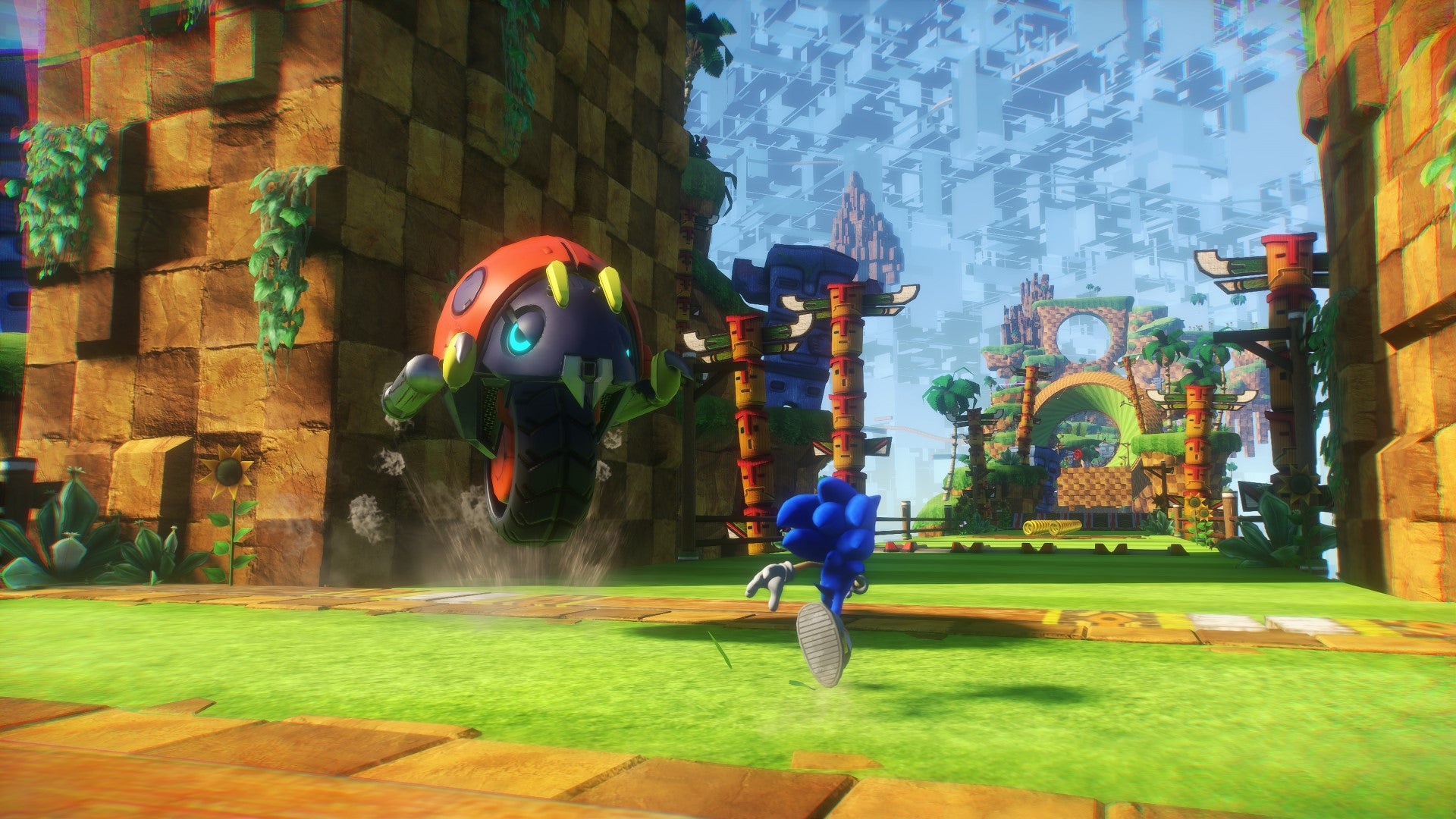And so he runs, pinging his way between springboard, winches, boost pads and little floating balloons, tapping the X button to bounce between them when a little target appears, beckoning him to do its bidding. Sonic looks east, he looks west. And he sees grind rails. He’s free, you see. And so am I. Free from giving the slightest toss about this stupid, rubbish series for undemanding children. No, I’m not bitter. I grew up playing Sonic and have subsequently enjoyed or endured every single game in the entire series across my 35 wasted years, defending his perceived missteps at almost every turn and insisting that his collected work had merit. That Sonic games, even at their worst, offered up something interesting, something strange; some mechanic presented in a way so alien to what is considered good “game design” that I can’t help but smile. Think of the way Sonic Adventure feels like it’s held together with worn masking tape, yet remains an absolute joy to explore. Oh, for God’s sake, of course I’m bitter. How could I not be bitter that Sonic has thrown all that delightful strangeness, that off-beat wrongness back in my weeping face? What the hell is Sonic Frontiers, anyway? A set of enormous maps that you gradually reveal portions of, complete with icons all over it to tidy up? It’s blinkin’, bleedin’ Assassin’s Creed, isn’t it? This is what people want from Sonic! This is what makes them cheer! To see him to fall in line. For him to be boring. Frontiers isn’t a total failure as a game, of course. Repeating the same actions and making Sonic incrementally more powerful is the usual open-world dopamine. The same sort of satisfaction you’d get from cleaning up your bedroom, except you can’t do anything with the space that’s left. That’s the most destructive problem with Sonic Frontiers: everything you do ultimately makes the game more boring. The “Cyberspace” stages seem like a blessed respite from the numbing repetition of the open world, but these more traditional 3D Sonic stages re-use stage layouts from past games by design – they chose to do this. It’s another form of surrender; a total acknowledgment and acceptance that the days of anything new - anything somewhat unique - are well and truly over. This technique is working, of course. People are saying Frontiers is the best Sonic game in years. They’re even saying it’s the best Sonic game ever (which it of course isn’t, but there’s no reason to fight back). The Sonic fanbase is vehemently post-truth, and has been since the Sega Saturn was a thing. It’s a fanbase I have found myself increasingly alienated from, and whose anger seems to have dramatically increased with its unwarranted self-assuredness. I’m pretty self-assured too - clearly - but having experienced the Sonic series sinceits 1991 debut, the difference for me is that the derivative likes of Sonic Mania, Sonic Forces, and now, the final acquiescence to the generic open-word collectathon, Sonic Frontiers, have mortally wounded my interest in Sonic The Hedgehog. An absurd statement on the face of it, but it’s true, and it’s a genuinely saddening outcome considering my former passion for both the games and the people who play them, who study them with a scrutiny that no other franchise has ever received. It’s something of a pleasant irony that it’s the most acclaimed Sonic in a long time that has seemingly ended my journey alongside the series, my immersion in its fandom. Sonic Frontiers has succeeded by shedding what made Sonic so arresting for me; its oddness, its unwillingness to conform to contemporary gaming tropes and standards. Now it’s a quasi-open-world full of stuff to pick up and map squares to fill in, to take down the same bosses over and over again to gather more items than you could possibly need. There’s a long future ahead of Sonic Frontiers, with several free DLC items and expansions planned, but I won’t be part of it. It’s the final nail in the coffin of my interest in Sonic The Hedgehog, whose imperfections have been replaced with content. The game’s inarguable success and the warm embrace of the enthusiasts propping it up mean that the reality of its gameplay is essentially of no consequence. Thirty years since Sonic really mattered, he’s back in the spotlight, just in time for gaming’s shepherd’s crook to hook my neck and comically yank me off screen. Cosmically, it of course doesn’t matter in the slightest that Sonic has at last shaken me off. The series is free to do what it wants, and has finally found a formula with broader appeal. It remains be seen whether it will still with this approach that clearly works, or if Sega will inexplicably pull the plug again. Me? I’ll be playing something else, probably some NES game, not a care in the world. Sonic the Hedgehog is dead to me. But, to the rest of the world, he’s more vital, more complete, more exciting than ever.

